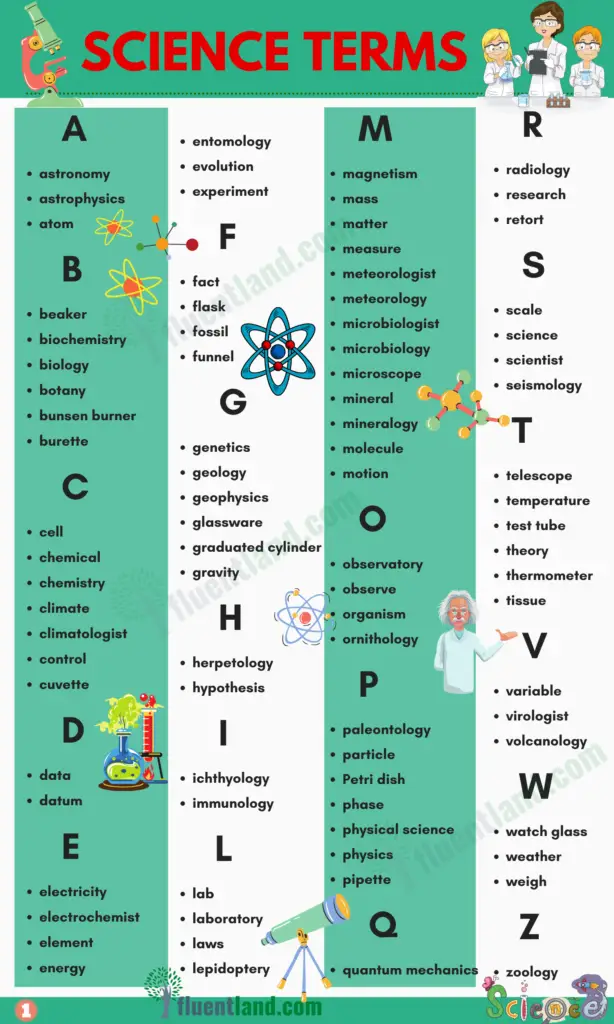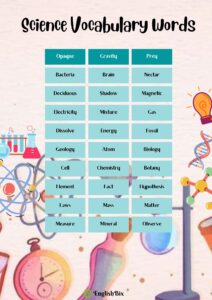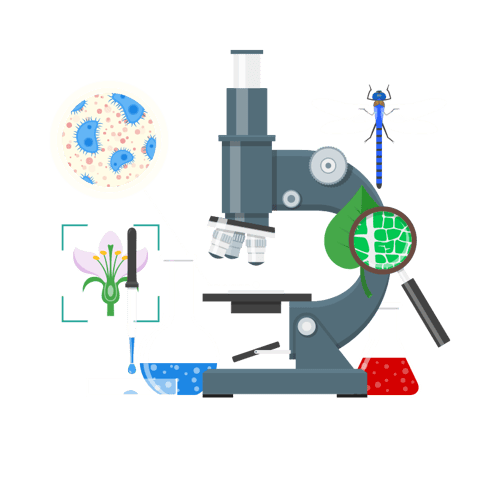Science Terms! The following is a list of common Science Terms in English.
Science Terms
Science Vocabulary Word List
Words That Start With A
astronomy
astrophysics
atom
Words That Start With B
beaker
biochemistry
biology
botany
Bunsen burner
burette
Words That Start With C
cell
chemical
chemistry
climate
climatologist
control
cuvette
Words That Start With D
data
datum
Words That Start With E
electricity
electrochemist
element
energy
entomology
evolution
experiment
Words That Start With F
fact
flask
fossil
funnel
Words That Start With G
genetics
geology
geophysics
glassware
graduated cylinder
gravity
Words That Start With H
herpetology
hypothesis
Words That Start With I
ichthyology
immunology
Words That Start With L
lab
laboratory
laws
lepidoptery
Words That Start With M
magnetism
mass
matter
measure
meteorologist
meteorology
microbiologist
microbiology
microscope
mineral
mineralogy
molecule
motion
Words That Start With O
observatory
observe
organism
ornithology
Words That Start With P
paleontology
particle
Petri dish
phase
physical science
physics
pipette
Words That Start With Q
quantum mechanics
Words That Start With R
radiology
research
retort
Words That Start With S
scale
science
scientist
seismology
Words That Start With T
telescope
temperature
test tube
theory
thermometer
tissue
Words That Start With V
variable
virologist
volcanology
volume
volumetric flask
Words That Start With W
watch glass
weather
weigh
Words That Start With Z
zoology
List of Science words with Examples
- astronomy
EX: Physics and astronomy are cognate sciences.
- astrophysics
EX: I am an astrophysics student for the University of TX.
- atom
EX: The nucleus of an atom consists of neutrons, protons and other particles.
- beaker
EX: The next days when the researchers flipped the beaker, the silicone oil began to form fat mounds.
- biochemistry
EX: Her specialty is biochemistry.
- biology
EX: The course will encompass physics, chemistry and biology.
- botany
EX: The life sciences include biology and botany.
- Bunsen burner
EX: You will learn how to use scientific apparatus such as test tubes, beakers and Bunsen burners.
- burette
EX: The burette is placed in water and the air pressure equalised by opening and closing the tap.
- cell
EX: DNA is stored in the nucleus of a cell.
- chemical
EX: Physical therapy alternates with chemical.
- chemistry
EX: The course will encompass physics, chemistry and biology.
- climate
EX: We need to assess the impact on climate change.
- climatologist
EX: A climatologist is greatly concerned with the time constants of the energy reservoirs of the world.
- control
EX: How do you operate the remote control unit?
- cuvette
EX: A new cuvette which is able to contain plastic centrifuge tube for fluorescence spectrophotometry is described.
- data
EX: The retention of data in a storage device.
- datum
EX: The crucial datum is this: the rate of gypsy-moth spread is now much more rapid than before.
- electricity
EX: Electricity companies pay a premium for renewable energy.
- element
EX: He was the discoverer of the element radium.
- energy
EX: It wastes energy to run the dishwasher half empty.
- entomology
EX: He decided to specialize in entomology after graduation.
- evolution
EX: In the course of evolution, some birds have lost the power of flight.
- experiment
EX: They are absorbed in the experiment.
- fossil
EX: This fossil may be over 2 million years old.
- funnel
EX: I need a funnel to pour petrol into the tank.
- genetics
EX: Knowledge in the field of genetics has been developing very rapidly.
- geology
EX: It is a problem that relates to geology.
- geophysics
EX: Developing seismoelectric exploration is the leading edge in geophysics.
- graduated cylinder
EX: Place 100 mL of pyridine in a 250-mL graduated cylinder , and, keeping the pyridine cold in an ice bath, pass in dry sulfur dioxide until the volume reaches 200 mL.
- gravity
EX: Gravity is a natural phenomenon.
- laboratory
EX: The laboratory was well insulated against all outside noise.
- microscope
EX: An object was magnified 200 times by the microscope.
- telescope
EX: The telescope was pointing in the wrong direction.
- temperature
EX: In hot weather the temperature gets very high.
- test tube
EX: The test tube was then put in an ultrasound bath for 5 minutes.
- thermometer
EX:Use a thermometer to gauge the temperature.
- tissue
EX: The virus remains dormant in nerve tissue until activated.
- variable
EX: The variable weather is a great trial to me.
- virologist
EX: The veterinary virologist and the clinician are naturally interested in effectively combating a viral infection.
- weigh
EX: The scales can be used to weigh other items such as parcels.
- zoology
EX: The library didn’t stock zoology textbooks.
Science Terms | Pictures
We know that Science is a field of study concerned with discovering and describing the world around us. It is based on observations and experiments.
Zoology, Biology, Geology, chemistry, Radiology and physics are some branches of science.
Today we are going to learn some cool science vocabulary words like brain, gravity, gas, atom, cell etc. and see their meanings to help you understand their significance.
Following is a list of examples of words related to science along with their meanings:
| Words | Meanings |
| Opaque | Difficult to see |
| Gravity | The force that attracts mass |
| Prey | kill and hunt for food |
| Bacteria | Unicellular microorganism |
| Brain | A coordinating organ of human body |
| Nectar | Juicy fluid within flowers |
| Deciduous | A tree or shrub name |
| Shadow | A dark area |
| Magnetic | Having magnetic properties |
| Electricity | Flow of electron |
| Mixture | A combination of different things |
| Gas | State of matter that can expand freely |
| Dissolve | Solid form in any liquid |
| Energy | Power |
| Fossil | The remains of plant or animal |
| Geology | Study of earth |
| Atom | The smallest particle |
| Biology | The study of living beings |
| Cell | Structural and Functional unit of life |
| Chemistry | The study of matter in terms of composition, properties and reaction. |
| Botany | The study of plants |
| Element | Species of atom |
| Fact | Any true information |
| Hypothesis | A proposed explanation |
| Laws | The system of specific rules |
| Mass | Matter in a body |
| Matter | Any physical substance |
| Measure | Computation of size, amount by apply any instrument |
| Mineral | Naturally existing Inorganic substance |
| Observe | A state of knowing facts by full attention and focus |
| Organism | An individual/living being |
| Particle | A minute entity of matter |
| Phase | Any entity of same composition |
| Physics | The study of matter and energy |
| Pipette | A laboratory toll used in lab |
| Quantum | Quantity of energy |
| Mechanics | The study of motion and force by apply mathematics |
| Radiology | The study of radiations for the disease treatment |
| Scale | Bony plates in the fish skin |
| Scientist | A person that has scientific knowledge and apply it on large scale. |
| Temperature | The degree of heat measurement |
| Test tube | A thin tube made up of glass |
| Zoology | Animal study on a broader level |
| Variable | Liable to change with conditions |
| Weigh | Expression of heaviness |
| Weather | State of atmosphere |
| Volume | The amount of space occupies by any object |
| Pressure | Force per unit area |
| Watch glass | A glass disc |
| Virology | Study of viruses |
| Data | Statistics and facts |
| Investigation | An action of finding facts |
| Inference | A conclusion |
| Prediction | A forecast |
| Directions | A route or course |
| Compare | Estimation of things |
| Increase | Greater in amount or size |
| Decrease | Smaller or fewer in amount or size |
| Microscope | An optical instrument |
| Results | Findings after an investigation |
| Magnify | Making objects larger in appearance by optical devices |
| Beaker | A glass ware for measuring the volume |
| Graph | A representation of data |
| Expand | Making larger |
| Analyze | Detail examination |
| Classify | Categorization on a common base |
| Material | The raw stuff for manufacturing of anything from |
| Practical | Learning by doing |
| Light | A form of energy |
| Dark | Absence of light |
| Proton | A constituent of an atom |
| Neutron | Sub-particle of an atom |
| Pitch | The intensity of sound |
| Barometer | Pressure measuring instrument |
| Humidity | A quantity expressing water vapor’s amount |
| Reflection | The turning of light/energy from any surface |
| Hygrometer | Humidity measuring instrument |
| Surface | Any outer part of an object/something |
| Accelerate | Degree of Quickness |
| Friction | Resistance due to movement |
| Kinetic | Movement |
| Equipment | Apparatus for a particular purpose |
| Circuit | A path that electricity follows during its flowing |
| Bulb | Light producing instrument |
| Motor | Any machine that works |
| Solubility | Ability of a substance to get dissolve |
| Reaction | Any chemical process that cause changes |
| Fission | The process of separation |
| Fusion | The process of joining things |
| Burning | The process of combustion |
| Rusting | A chemical process that spoil iron |
| Separate | Division by physical methods |
| Hardness | The state of being hard |
| Properties | Attribute that specify something |
| Melting | The process of liquefication by heating |
| Boiling | Process occurs when matter reaches near its boiling point |
| Brittle | Hard in nature but break without showing elasticity |
| Conductor | Material that pass electricity |
| Insulator | Heat/electricity resistance substance |
| Transparent | Clear |
Note: Do you some common words related to science fiction?
Here are some hard science fiction vocabulary words: Atmosphere, Black body radiation, Comet, Dark Matter, Nebula, Plasma, Pulsar, Quark, Radiation, Solar Flare, Super Conductivity, Titan, Universe, Velocity
Let’s have a look at some collection of hard science terms and phrases in alphabetical order a to z.
- A Words: Acceleration, Alpha rays, Argon, Asteroids
- B Words: Beta rays, Bivalent, Bivalent, Bandwidth, Black Hole, Bluetooth
- C Words: Catalyst, Carbohydrates, Celsius, Circuit, Comet
- D Words: Decible, Deoxyribonucleic Acid (DNA), Diffraction, Diode, Distance, Dust
- E Words: Electron, Elasticity, Electromagnetic Waves, Ethernet, Extinction
- F Words: Fahrenheit, Filament, Freeze, Frequency, Friction
- G Words: Gigabytes, Gravity
- H Words: HTML, Hypertext, Hypothesis
- I Words: Impact, Induction, Inertia, Insulator, Internet
- J Words: Joule
- K Words: Kelvin, Keratins, Kinetic Energy
- L Words: Light, Luminosity, Lightning
- M Words: Magnetism, Media, Magnetic Field, Mathematics, Milky Way, Momentum
- N Words: Nanosecond, Network, Nerve, Nocturnal, Nuclease
- O Words: Ovulation, Optical Light, Occulation
- P Words: Particle, Period, Phobia, Planet, Potential Energy, Power (P)
- Q Words: Quantitative, Qualitative, Quantum Theory
- R Words: Radiation, Radioactivity, Refraction, Relativity, Revolution, Rotation
- S Words: Satellite, Scalar, Solar System, Static Electricity, Speed
- T Words: Time, Torque, Tumor, Turbine
- U Words: Ultraviolet Light, Universe, Uncertainty, UPS, Uterus
- V Words: Vacuum, Vector, Velocity, Virus
- W Words: Watt, Wavelength, Weight, Work
- X Words: X- chromosome, X- Ray, X- band
- Y Words: Yolk, Yellow fever
- Z Words: Zoology, Z-DNA
We hope that this list will give you some insight on different basic scientific terms and how they are related.
Keep exploring EnglishBix for more resources related to subject specific vocabulary.
Quick Links
Whether you want to brush up on biology, study space science, or prep for a physics test, this collection of science vocabulary is for you! Our lists cover essential terms and concepts from all major scientific disciplines.
18 lists
457 words
24,407 learners
Learn words with Flashcards and other activities
Other learning activities
VOCABULARY LISTS IN THIS COLLECTION:
Science Vocabulary Word List
Words by Theme IndexScience Vocabulary Word List :
| A
astrophysics B beaker C cell D data E electricity |
F
fact G genetics H herpetology I ichthyology L lab |
M
magnetism O observe P paleontology Q quantum mechanics |
R
radiology S scale T telescope V variable W watch glass Z zoology |
Words by Theme Index
From Science Vocabulary Word List to HOME PAGE
The comprehensive grade-by-grade science vocabulary lists below are based on state and national science standards. They cover the key science content areas for each grade from kindergarten through high school. The lists can be used with all of VocabularySpellingCity’s 35+ learning activities and science vocabulary games. Read MoreRead Less
For each grade and science content area, there are both detailed lists and summary scientific term lists. For example, in the kindergarten science section, motion is one of the key areas. For kindergarten science, there are 85 motion vocabulary words organized in 9 lists. There is also a summary list that includes only the eight most significant scientific wordss relating to motion at the kindergarten level. Offering both detailed lists and summary lists provides teachers the right vocabulary tools they need regardless of how much detail their lessons require at any given time — whether introducing a new science topic, reviewing an already studied science category, or delving deeply into a particular scientific area, it’s all just a click away!
Sentences and definitions for the words on the Science Vocabulary lists have been customized to reflect their usages within the context of science. So when terms have multiple meanings or when they can be defined in both a general or scientific manner, the scientific definition or sentence is used. When a term is used at several different grade levels, grade-appropriate definitions and examples are used. A word may also appear in different categories. For example, the word “sun”, when studied within the context of Energy will have a different meaning than the word “sun” in Space Science. Below is an example of VocabularySpellingCity’s differentiated treatment of science words and vocabulary:
| SUN | Definition | Sentence |
|---|---|---|
| K – 2 | the Earth’s source of heat and light | The sun is bright on a cloudless day. |
| 3 – 5 | the star at the center of our planetary system | The sun is highest in the sky at noon. |
| 6 – 8 | a medium-sized, main -sequence star orbited by planets and emitting light and heat | As the basis of our solar system, the sun sustains life on Earth. |
| 9 – 12 | a gaseous body emitting heat and visible light by thermonuclear reactions and around which a planetary system revolves | Energy is produced at the sun’s core via a nuclear fusion reaction called the proton-proton chain. |
The writing and editing of these lists, sentences, and definitions was performed under contract by science teachers and curriculum specialists from around the country to whom we are very grateful.
The lists can be imported into teacher or parent accounts. Once imported, the lists, sentences, and definitions can be customized to the member’s needs (Click for information on how to customize sentences and definitions).
Science Vocabulary In the Classroom
VocabularySpellingCity’s science words lists and learning activities can be integrated into a science curriculum in a number of ways.
Reinforcement of key concepts and/or assessment – For example, Mrs. George taught an investigative science unit to her third graders on energy. A week later, for reinforcement, she had students work in groups of four and play MatchIt online with the third grade energy lists. The students who needed extra reinforcement were given printable versions of MatchIt to practice at home. The following week, the students took the vocabulary tests on VocabularySpellingCity. Since the teacher is a Premium Member, the students’ test results, including incorrect answers, were automatically recorded.
Vocabulary introduction prior to studying a unit – Mr. Cabrera’s 7th grade class was about to begin a science unit on matter. Before teaching his students about the laws and properties of matter, he wanted to make sure they were familiar with the key scientific terms they would encounter. Mr. Cabrera loaded VocabularySpellingCity’s interactive FlashCards activity for the 7th Grade Matter Summary List on the whiteboard so that the whole class could review the definitions for each word and hear each word used in context. He then divided the students into two teams for a fun round of WhichWord? Definitions The students now had a firm understanding of the concepts that would be presented in the matter unit and were able to understand concepts more readily.
Starting in kindergarten and continuing through 12th grade, students are exposed to and expected to learn an extensive amount of information in science, from facts and data to concepts and misconceptions. VocabularySpellingCity’s Science Vocabulary lists offer teachers a convenient way to build their students’ science knowledge and our interactive science vocabulary games and activities make learning the concepts fun for students, which can lead to better understanding and retention.



